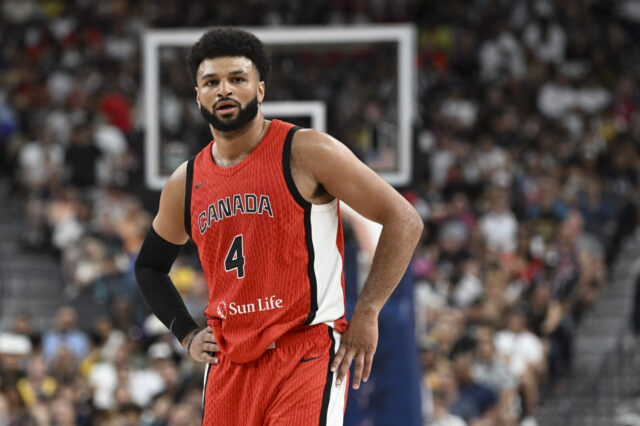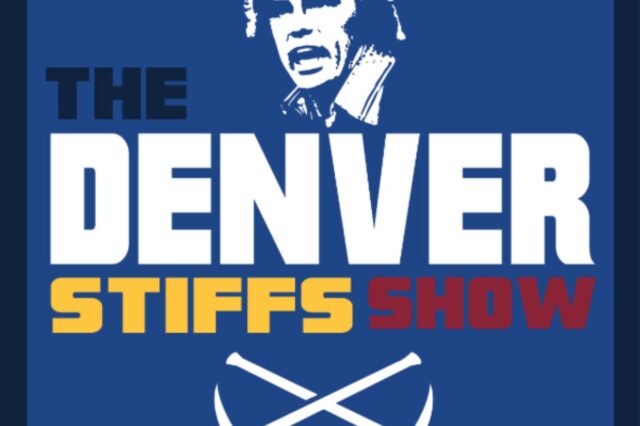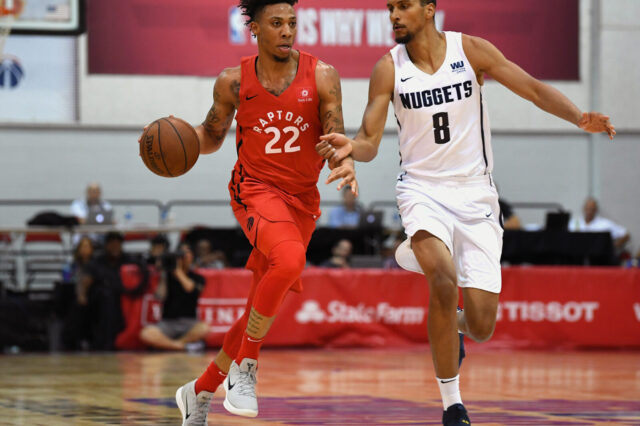Early Monday morning, Shams Charania of Yahoo.com broke the first big free agency news of the summer. While it’s not official yet, or legal, the Nuggets are to decline their team option on star center Nikola Jokic, pushing him into restricted free agency, at which point the two parties are expected to reach an agreement on a five-year, $146.5 Million contract.
In many ways this is a perfect marriage. In his teenage years, Jokic, a Serbian born point guard at heart with equal passion for pounding both the rock and Coca-Cola, was barely on anyone’s radar as an NBA prospect. The Denver Nuggets, infamous for their struggles in free agency and in desperate need of a successor to Carmelo Anthony as the face of the franchise, were barely on anyone’s radar as a team worth watching. The Nuggets weren’t just bad, they were irrelevant—the worst possible fate for an American sports team.
And so as the eyes of the national gaze remained fixed on the league’s flashiest players and brightest host cities, the Nuggets and Nikola Jokic found each other, quietly, in the second round of the 2014 NBA draft. When the Nuggets made the 41st pick, Jokic was literally asleep, most of us didn’t even have the draft on, and ESPN was running an ad for Taco Bell.
An appropriate welcome for a no-name euro with conditioning issues, but an ironic one nonetheless. Little did anyone know, Denver included, that their draft and stash project would eventually become the highest paid Nugget in team history, as Jokic will when the deal becomes official.
The five year max contract may seem like a lot to those whose gaze has now shifted to both Denver and Jokic himself for the first time. He’s less athletic than some of the blog boys, his defense is much maligned and he in no way fits the psychological profile of an NBA star. But Jokic has transcended his seeming physical and cultural limitations with an uncanny skill set and a Larry Bird-esque feel for the game of basketball.
Jokic has grown into perhaps the single most skilled passer at his position on the entire planet. His ability to transform a half court offense has blasted away at the impassable mountain rock that stood between Denver and brighter days. They’ve missed the playoffs in five of the six seasons since Carmelo forced his way to New York, but with Jokic locked down Nuggets fans can see light at the end of a tunnel that didn’t even exist at the start of the 2016 season.
The question that will inevitably be tossed around the literal and proverbial water coolers in the physical and online spaces that house such discourse has become a popular response to the news of any potential max deal: “is this player good enough to win a championship as the best player on a team?” That’s not entirely clear with Jokic.
The questions surrounding his defense are legitimate, even if the answers they often precede are rooted more in hyperbole and small sample size than those espousing such criticisms would ever concede. Moreover, even the very best centers in the league today struggled to stay on the floor in the 2018 NBA Playoffs. There were moments when Rudy Gobert, the best defensive big man alive, looked almost helpless on the court against Houston. At times, Joel Embiid looked like he was hurting Philadelphia more than helping in their second round matchup with Boston. Even Clint Capela—a spry two way center and maybe the most sensible fit for his team at the five in the entire league—left us wondering if Houston should be experimenting more with PJ Tucker in his place.
Why should Jokic, described as the most athletically challenged top-tier big man in the league, be any different? He might not. That’s a reality Nuggets fans must prepare themselves for.
What is clear though, at least to those who have been paying attention to the Nuggets, is that that question—”can they win with him as their best player?”—is the wrong one to be asking. In this league, a team can certainly stumble into a brief spell of success without a game changing player on their roster. Consider George Karl’s 2012 Nuggets, who won 57 games without a true star. But that type success is never sustained.
As we all know, the best places to be in the NBA are near the very top of the league or the very bottom. One can’t hope to reach the top without a star. In the absence of one, a pursuit of a title becomes more foolish than noble, robbing a team of their best chance at finding one: the draft lottery. Nikola Jokic is not LeBron James, but he is far too good of a player to pass on when he lands in your lap. With Jokic on the roster, tanking should be out of the question and competing shouldn’t be viewed as simply a fantasy—no matter how unlikely an actual title may be.
The better questions to ask of Jokic’s impending extension are: is he a star caliber player who increases their chances of contention? Are they likely to find a better player any time soon? The answer to that first question is a resounding yes, defense notwithstanding. The answer to the second is clearly no. Here’s a complete list of players to manage the per game averages that Jokic did last year, sorted by field goal percentage. There’s max contract worthy and there’s hall of fame worthy. The latter is not a hyperbolic description of Jokic’s start to his career.
| Criteria | Totals | Per Game | Shooting | |||||||||||||||||||||||||||||
|---|---|---|---|---|---|---|---|---|---|---|---|---|---|---|---|---|---|---|---|---|---|---|---|---|---|---|---|---|---|---|---|---|
| Rk | Player | Season | Age | Tm | Lg | PTS | TRB | AST | WS | G | GS | MP | FG | FGA | 2P | 2PA | 3P | 3PA | FT | FTA | ORB | DRB | STL | BLK | TOV | PF | FG% ▼ |
2P% | 3P% | eFG% | FT% | TS% |
| 1 | Wilt Chamberlain | 1966-67 | 30 | PHI | NBA | 24.1 | 24.2 | 7.8 | 21.9 | 81 | 45.5 | 9.7 | 14.2 | 9.7 | 14.2 | 4.8 | 10.8 | 1.8 | .683 | .683 | .683 | .441 | .637 | |||||||||
| 2 | Wilt Chamberlain | 1967-68 | 31 | PHI | NBA | 24.3 | 23.8 | 8.6 | 20.4 | 82 | 46.8 | 10.0 | 16.8 | 10.0 | 16.8 | 4.3 | 11.4 | 2.0 | .595 | .595 | .595 | .380 | .557 | |||||||||
| 3 | Larry Bird | 1984-85 | 28 | BOS | NBA | 28.7 | 10.5 | 6.6 | 15.7 | 80 | 77 | 39.5 | 11.5 | 22.0 | 10.8 | 20.4 | 0.7 | 1.6 | 5.0 | 5.7 | 2.1 | 8.5 | 1.6 | 1.2 | 3.1 | 2.6 | .522 | .529 | .427 | .538 | .882 | .585 |
| 4 | Oscar Robertson | 1962-63 | 24 | CIN | NBA | 28.3 | 10.4 | 9.5 | 16.8 | 80 | 44.0 | 10.3 | 19.9 | 10.3 | 19.9 | 7.7 | 9.5 | 3.7 | .518 | .518 | .518 | .810 | .588 | |||||||||
| 5 | Kevin Garnett | 2002-03 | 26 | MIN | NBA | 23.0 | 13.4 | 6.0 | 15.6 | 82 | 82 | 40.5 | 9.1 | 18.1 | 8.8 | 17.2 | 0.2 | 0.9 | 4.6 | 6.1 | 3.0 | 10.5 | 1.4 | 1.6 | 2.8 | 2.4 | .502 | .513 | .282 | .508 | .751 | .553 |
| 6 | Nikola Jokic | 2017-18 | 22 | DEN | NBA | 18.5 | 10.7 | 6.1 | 10.7 | 75 | 73 | 32.6 | 6.7 | 13.5 | 5.2 | 9.7 | 1.5 | 3.7 | 3.5 | 4.2 | 2.6 | 8.1 | 1.2 | 0.8 | 2.8 | 2.8 | .499 | .538 | .396 | .554 | .850 | .603 |
| 7 | Larry Bird | 1983-84 | 27 | BOS | NBA | 24.2 | 10.1 | 6.6 | 13.6 | 79 | 77 | 38.3 | 9.6 | 19.5 | 9.4 | 18.6 | 0.2 | 0.9 | 4.7 | 5.3 | 2.3 | 7.8 | 1.8 | 0.9 | 3.0 | 2.5 | .492 | .504 | .247 | .497 | .888 | .552 |
| 8 | Oscar Robertson | 1961-62 | 23 | CIN | NBA | 30.8 | 12.5 | 11.4 | 15.6 | 79 | 44.3 | 11.0 | 22.9 | 11.0 | 22.9 | 8.9 | 11.0 | 3.3 | .478 | .478 | .478 | .803 | .554 | |||||||||
| 9 | Oscar Robertson | 1960-61 | 22 | CIN | NBA | 30.5 | 10.1 | 9.7 | 13.2 | 71 | 42.7 | 10.6 | 22.5 | 10.6 | 22.5 | 9.2 | 11.2 | 3.1 | .473 | .473 | .473 | .822 | .555 | |||||||||
| 10 | Russell Westbrook | 2017-18 | 29 | OKC | NBA | 25.4 | 10.1 | 10.3 | 10.1 | 80 | 80 | 36.4 | 9.5 | 21.1 | 8.3 | 17.0 | 1.2 | 4.1 | 5.2 | 7.1 | 1.9 | 8.2 | 1.8 | 0.3 | 4.8 | 2.5 | .449 | .485 | .298 | .477 | .737 | .524 |
| 11 | Russell Westbrook | 2016-17 | 28 | OKC | NBA | 31.6 | 10.7 | 10.4 | 13.1 | 81 | 81 | 34.6 | 10.2 | 24.0 | 7.7 | 16.8 | 2.5 | 7.2 | 8.8 | 10.4 | 1.7 | 9.0 | 1.6 | 0.4 | 5.4 | 2.3 | .425 | .459 | .343 | .476 | .845 | .554 |
When Jokic was handed the keys to the car designed by assistant coach Chris Finch in December of 2016, the Nuggets took off. From the 15th on, they possessed the league’s most lethal offense per 100 possessions. Despite missing the playoffs by one game, the Nuggets exited the 2016-17 season with more reasons to be excited than bitter. They had found their man, and moreover, they had found their offensive identity.
Last season, despite missing 100 days from the highest paid player on the team—Paul Millsap—Jokic led the Nuggets to 46 wins in the brutal Western Conference. It wasn’t enough to make the playoffs, but the truth is it left them closer in the standings to the three seed than the West’s cellar dwellers. This all happened in spite of the heavy minutes in which Jokic was required to share the court with Mason Plumlee, which is, well, we’ll just call it suboptimal.
In Carmelo Anthony’s eight year tenure with the Nuggets, Denver won 46 or more games just four times. In one of those four seasons, 2010, Melo recorded a negative on/off split. Anthony is unquestionably the most talented player that Denver has ever drafted and holds by far the biggest star profile of any player to don a Nuggets jersey. But it’s not necessarily clear that he had a much more positive impact on his team’s offense than Jokic does now, or might later as he continues to develop.
Jokic is a star. He is not an infallible one, and the roster construction in Denver doesn’t just fail to mitigate his defensive deficiencies, it exposes them to a near unfair degree. But he’s still a star, and one that fell into their laps with the 41st pick.
For a team in Denver’s position, there was never any choice to be made here. You can’t compete in this league without a player like Jokic. You tank in hopes of finding one. Denver already found theirs and they’d have been foolish not to lock him down.
It remains to be seen if the highest paid Nugget in team history can carry them further than ever before, but we have our answers to the relevant questions. Jokic gives them a chance at a brighter future and that’s all you can ask for. The Nuggets have secured their next face the franchise and they’ve selected their blueprint for a path back to contention—it’s written in Serbian.


